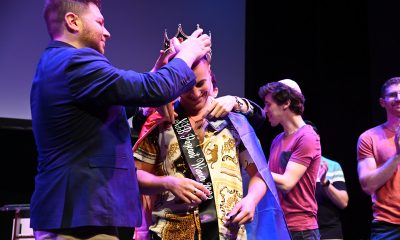a&e features
Adam Rippon on new life, loves, memoir and skating naked
Rippon says Ashley Wagner abuse allegations, Coughlin suicide rocked skating world
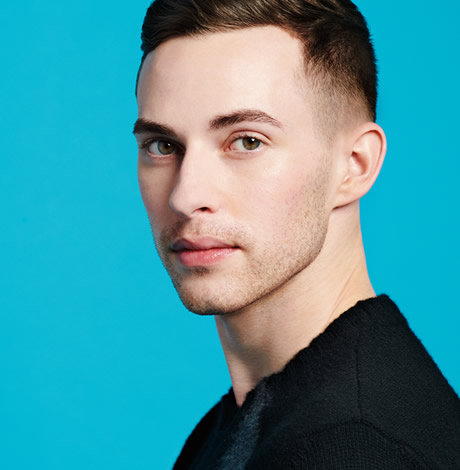
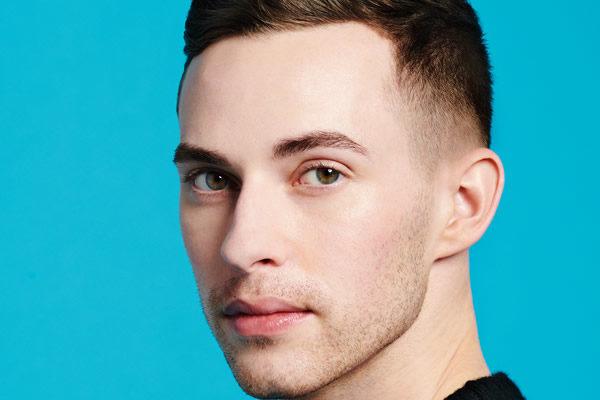
Adam Rippon
In conversation with Liz Dolan
Wednesday, Oct. 16
7 p.m.
Sixth & I Synagogue
600 I St., N.W.
Tickets: $20
ticket+book: $32
two tickets+book: $45
(books will be pre-signed but photos with Rippon will be taken)
We blitzed through a torrent of questions with Adam Rippon by phone last week. The bronze medal-winning gay breakout star (and self-proclaimed “America’s sweetheart”) releases his memoir “Beautiful on the Outside” Oct. 15. He and skier pal Gus Kenworthy each came out in 2015 and last year became the first openly gay male U.S. athletes to compete at the Winter Olympics. Rippon is in Washington (at Sixth and I Synagogue) Wednesday, Oct. 16 as the second stop on a 13-city book tour. His comments have been slightly edited for syntax and length.
WASHINGTON BLADE: How did the book come about?
ADAM RIPPON: Well, right after the Olympics, my team was saying that it might be a fun idea to write a book and I thought that this, like, really felt like a full chapter of my life sort of coming to an end and a new one was starting so I felt like it would be a really therapeutic almost experience. And I thought it would be a good thing for me to do, to kind of debrief and sort of be my moment to soak in everything that was like going on. So it was my team’s idea but then ultimately it was something that I did truly want to pursue.
BLADE: How long did it take to write?
RIPPON: About six-seven months. It wasn’t too long but it was a substantial amount of time.
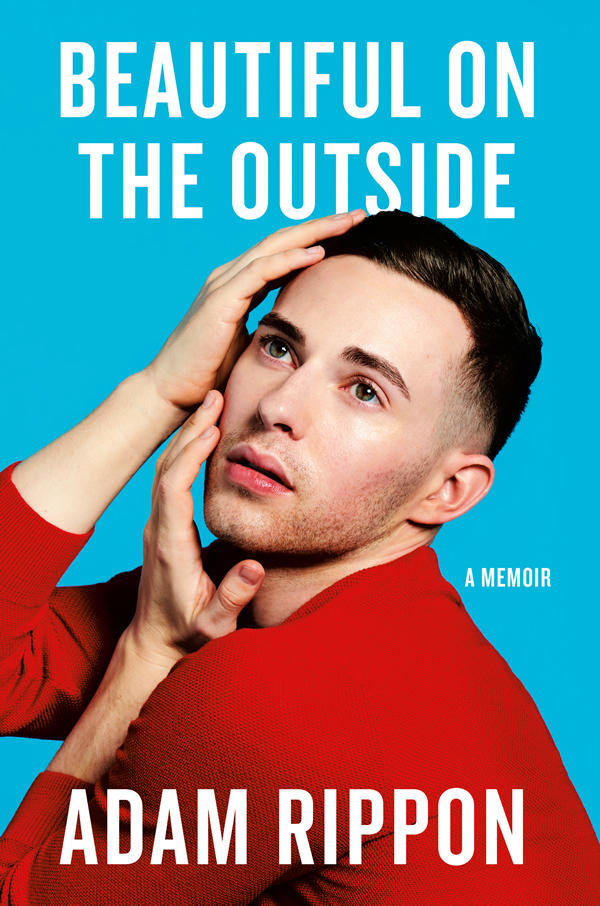
BLADE: A lot of your appeal is the way you come across on camera. Were you concerned that that might not translate to the written page?
RIPPON: Totally. One thing that I really focused on was (making sure) the writing felt very in person, so that whatever you were reading felt like I could have been sitting right next to you like on a couch telling you this story and you were hearing my voice. So that was really important to me because I feel less like a writer and more like a storyteller. So I wanted to make sure, especially when I would be doing the audiobook, that it really felt like I wasn’t adding any words or saying any words that I wouldn’t say in a conversation.
BLADE: You share a lot of hard-won wisdom in the book. Were those convictions about life already in your head and bones or did the process of writing the book kind of help you distill and articulate some of that?
RIPPON: I think when I wrote the book, that was such an important thing for me to add into it because those are lessons and scenarios and things that I had learned and they were just so important to me, that was something really I wanted to add into the story. … Sometimes I just laugh at myself and move along through life through different struggles and things of that nature, but I really did learn a lot about myself, it really prepared me for the bigger moments.
BLADE: A lot of the book is about how what was going on in your head affected your skating. Did you ever work with a sports psychologist when you were competing?
RIPPON: I did but … it’s funny now, post skating career, I see a therapist but when I was skating, I felt like, no that’s weak, I’m not going to go to a sports psychologist, I’m going to just suck it up. I wish I had, but it’s harder because when you’re a competitive athlete. One you don’t have a lot of means to go out and find someone on your own and they do offer someone but it’s like someone that everybody uses, like all of your competitors are going to use the same sports psychologist, so in a way I was like, “Am I really going to tell my deepest fears with somebody’s who’s then gonna work with all of my competitors too?” I was like, no, I’m gonna tell this bitch that yeah, everything’s fine and I’ve never felt better. So it’s hard but now as an adult, I can go out and find someone on my own who’s personally mine and that was just something I did not have access to when I was competing because it was really expensive.
BLADE: How often are you on the ice these days?
RIPPON: Maybe once or twice a month now. Just skating for myself. Sometimes if I have a day off, I’ll go work with one of the skaters I used to train with, Mariah Bell. Working with her some makes me feel connected to skating, but I don’t skate very much on my own anymore.
BLADE: Would you like to do more skating exhibition tours?
RIPPON: I would, but they take so much time and energy to prepare for and I would not ever want to do one and not feel like I was giving my best. … Right now I really do want to focus on pursuing these other endeavors that are available to me now and I do want to pursue them because I do think the time to do that is right now and if there is something comes up in skating, it’ll make sense. Right now, I think I’m really focused on writing this book and that kind of hustle.
BLADE: It looks like you’ve stayed in great shape. Do you feel pressure to have perfect abs? I mean the shape you were in for Olympics has to be impossible to maintain I imagine.
RIPPON: Well, you know what? I’m gonna be super honest. After the Olympics, I went to the gym and I was like, “I can’t do this anymore. I’ve gone here every day of my life for 20 years and I just don’t have the motivation,” and that was OK. But I didn’t go to the gym for maybe a year.
BLADE: Oh wow.
RIPPON: Yeah, I know. It was a lot.
BLADE: But you didn’t gain 300 pounds or anything. I haven’t seen you lately but you look like you were in great shape on “Dancing With the Stars.”
RIPPON: I’m not 300 pounds yet, but no. … I realized I just needed to find new goals at the gym because it’s something I really enjoy. So I’ve been going for like the past month and have been working out pretty regularly with my old trainer again and, of course, the workouts are totally different, because it’s no longer about trying to be as good a skater as possible. But I really love the rush you get from finishing a workout.
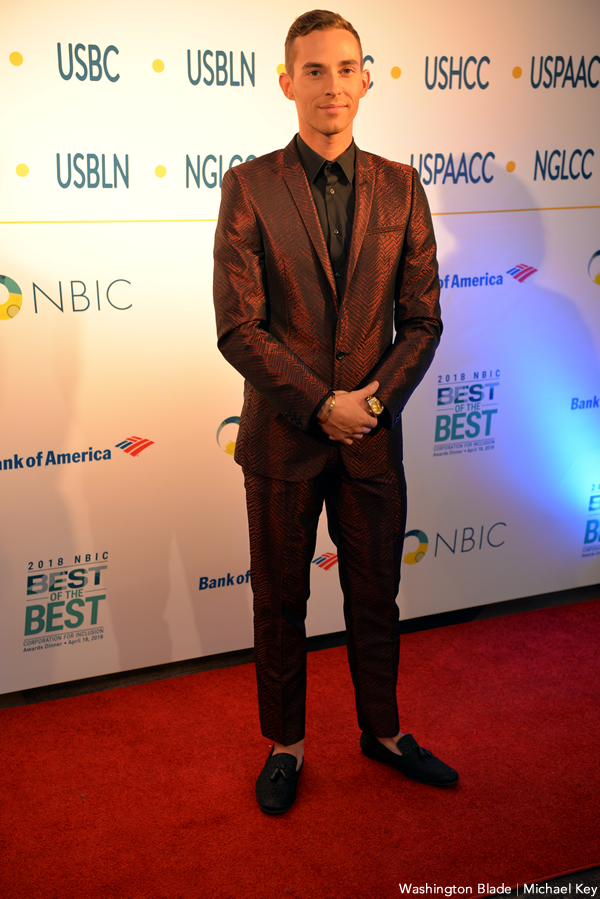
BLADE: You make a joke in the book about your hook-ups not believing you had an office job because nobody with a desk job would have an ass like yours. What kind of currency has having that kind of butt given you in your personal life? Is it something your boyfriends have gone on and on about or it something that maybe seems more exaggerated from afar? Tell me about your ass, Adam.
RIPPON: Well, here we go. How much time do you have? (laughs) No, I’m kidding. Um, the one thing I’ve noticed, now surrounding myself with people who are not athletes by profession is that everybody who works out and goes to the gym, the hardest thing for them is legs. I’ve noticed going back to the gym, that’s always been my upper hand because I’ve done only legs for so long. With my boyfriend, he’s mostly envious that I have these bigger legs and, like, a butt that really fills out my pants. Mostly he’s jealous but he does like it, which is good because I can’t really get rid of it.
BLADE: At one point in the book you say you were having trouble with quad toe so you had to switch to quad lutz. Why not quad sal?
RIPPON: It’s a little different with the quads. That’s why you see these Russian junior girls and some of them won’t do triple axels but their only two quads are toe and lutz. The lutz may be the hardest because that entrance is so hard but when you have the torque just right, it really snaps the quickest into rotation. I think when you’re learning triples, the skill of how you should learn them is correct, but with quads, it’s more like which do you feel and I think difficulty sort of comes in second.
BLADE: Did you ever play around with quad loops or flips?
RIPPON: Yeah. I think in my life, I’ve landed a (quad) flip, a salchow. It was just one day and it’s going really well, then the next day I’m just doing like cheated triples and I’m like, “Oh, OK, here we go.”
BLADE: Have we hit the ceiling on quads? Is it realistic to think somebody might land a quad axel someday?
RIPPON: I think so. I never thought I’d see a day where somebody has a program like Nathan Chen’s planned programs and it’s something he actually does and it’s not, like, a joke. And it’s the way he does it really effortlessly and you don’t really actually notice he’s doing all these quads ‘cause they’re so well done, which is the scariest part of his skating.
BLADE: Have you stayed in touch with him?
RIPPON: I’ve stayed in touch with pretty much everyone I competed with and with Nathan, we had the same coach for a while. I have such a soft spot for him and the things that he does. I’m always cheering for him. He’s just a really, really good kid and, you know, works super hard and is so well rounded. I love catching up and seeing how he’s doing.
BLADE: I know it’s probably hard to put into words, but how much harder is the triple loop than the triple toe as the second jump in a combination?
RIPPON: Adding the triple loop onto something is much harder because the room for error and correction on landing the first jump is so small. When you’re doing a triple loop in a combination, the biggest thing is you cannot readjust or fix the landing position of that first jump because it happens so quickly and it immediately needs to come together. With the toe loop, you can readjust the tap into the ice, you can tap a little further, tap quicker, you can jump a little more from the assistance of the free leg, so it’s still incredibly difficult but a triple loop combination is by far much harder than a triple toe loop combination.
BLADE: Were you more team Zagitova or Medvedeva in the ladies’ event last Olympics?
RIPPON: You know, I think that I was really impressed with Zagitova, I thought she skated very well, but I do have to say the way that Medvedeva handled herself as like a two-time world champion, and then to go out and skate two clean programs, I just felt she had a lot of substance to her skating maybe her style wasn’t the I don’t know, wasn’t everybody’s cup of tea. She performed, she had everything that an Olympic champion should have and I really felt that she kind of earned it. Zagitova skated a little bit like a really excellent junior lady in her first year senior. It wasn’t as refined and Medvedeva was a two-time world champion heading into that event, she was very refined and in that moment and was incredibly young, but yet had some womanly flair to her, which I really admired. I completely see why Medvedeva was the silver medalist and Zagitova was the gold medalist, I understand, but if I were judging I would have had Medvedeva first.
BLADE: Did it bother you that Zagitova back-stacked all her jumps? (Jumps completed in the second half of the long program are weighted in scoring.)
RIPPON: No. I mean, of course I want to be like, yes, it doesn’t make for a nice program, but then at the end of the day, we have rules and we have points and you know I think if Eteri’s goal, their coach, is that she has a student who wins, and that they compete and there’s no pecking order of who should win and who shouldn’t win, you’re gonna go and you’re gonna do the most that you can do. So, I mean she played the game within the rules and she knew that Medvedeva had better style, so the way to make Zagitova more competitive against Medvedeva would be to just technically you know, put everything at the end. So is it annoying, like a little bit, but is she cheating? No. Everybody had that option and everybody knew that, so it doesn’t bother me. I kind of look at it like I don’t like it, but you’re smart.
BLADE: Why are they wrapping everybody up in those goddamn jackets now the second you step off the ice? They never used to do that.
RIPPON: It’s a sponsor thing. While you’re just sitting there in kiss and cry, they want the sponsor logo to be visible on TV. Obviously you couldn’t skate with a logo, but when you’re just sitting there waiting for scores, you can see what it says on the label.
BLADE: I wasn’t a big fan when they changed the rules to allow vocal music. You took advantage of it. What was your opinion?
RIPPON: I didn’t like it at first, but then I really enjoyed it as a skater. I just thought it opened the door for a lot of really cool ideas.
BLADE: How was Tonya Harding on “Dancing With the Stars?” Did you develop any camaraderie with her?
RIPPON: I wouldn’t say camaraderie, but she was super nice and she’s fun. She’s super funny, really personable. You know, I doubt Nancy (Kerrigan) would think that, but she’s super personable. I had no problem with her. She was nice.
BLADE: Did you admire her skating back in the day?
RIPPON: The first competition I ever watched was ’98, so I never grew up with her, but once I went back and started watching things, I’ll always remember that opening at 1991 nationals with the “Batman” theme and that mint green dress.
BLADE: Did you like the movie “I, Tonya”?
RIPPON: I mean Margot Robbie when she does press for the movie, she says it’s Tonya’s side of the story and I think she did a really good job of that. But I think even Margot would tell you that the truth probably lies in the middle.
BLADE: So many skaters — Brian Boitano, Jeffrey Buttle, Johnny Weir — came out after they stopped competing. I’m not asking for names, but are there still closeted skaters that you know of or is that era finally over?
RIPPON: I think we’re becoming past it and I really feel that like I hope that I had something to do with it, where people felt like it didn’t really matter and you could still be successful. But I do think that the pressures of someone like me and someone like Brian Boitano or Jeffrey Buttle are so different. I was never a favorite for a world title, there was no pressure like that. I was just trying to kind of make my world team and see if I, if someone’s having a bad day, could swoop in for a world medal. Or like at the Olympics, know that I could be a really good asset to the team event. So I knew that like the pressures for me were totally different, they were not the same as somebody trying to win a world title, I wasn’t going to be as scrutinized. I mean especially compared to somebody like Brian Boitano in the ‘80s. So it’s a totally different time but I do think that because a lot of the attention, I did get at the Olympics, I think it broke down a lot of stigma. Because yes, there was a gay athlete but everything else wasn’t about that, which I think was great. I think it was a really good thing.
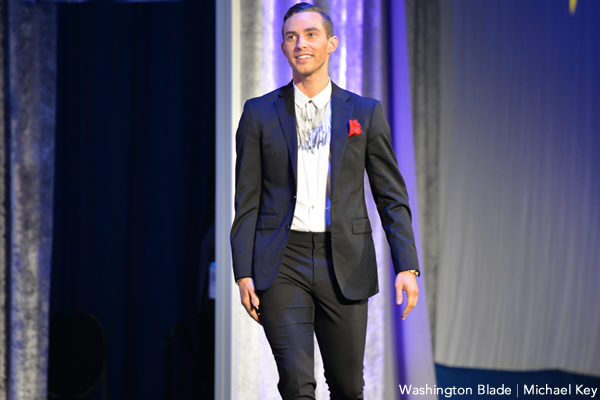
BLADE: Why are there so many more medal opportunities in the summer games? Can you imagine if figure skaters had the number of medal opportunities as Michael Phelps?
RIPPON: I think when you get into subjective sports where it’s all based on human judging, it’s really hard to break those into different categories. And it’s part of the drama of skating that there aren’t all these opportunities. That’s one reason I love the idea of a team event, not only because I’m a medalist from it, but I love that it’s brought different stars from the Olympics forward. I mean look at Yulia Lipnitskaya from Sochi. In the team event, she was the star of the whole competition and when we think about the individual, I even forget that she competed in it. So it gives other people the chance to be Olympic stars in a different capacity. The whole point of the Olympics is to inspire people to get into sports. That really is truly what it is. And I think the team event really does that.
BLADE: You obviously came up long after compulsories were eliminated. When you go back and watch old performances, do you think skaters in the ‘70s and ‘80s had better form, better edges, because of having to learn the school figures or not so much?
RIPPON: I think the quality of skating is going up because the demands of what you have to do now technically are so high. You have to do so many transitions into jumps and so many turns and steps into all of your elements so you get a nice transition score and I think that’s pushing people to learn these turns and steps in the proper way and faster than if they’d started with figures. This way you jump right into it and the learning curve is a lot quicker. You know you have to do it this way because that’s how it’s judged so it’s the only way to be competitive.
BLADE: Were you really fully nude except for your boots for the ESPN shoot or did you have some kind of little loincloth on or something?
RIPPON: I was 100 percent naked and it was actually at the rink I trained at. There are three rinks and one is all the way at the end in the corner and they blocked it off and had security and everything but yeah, it was fully nude, and for the first two minutes it was like, “Isn’t it weird that I can see my dick and I’m skating,” but then you get going and you’re like it doesn’t really become a thing anymore and nobody’s really fazed by it because they’ve shot like a million naked athletes before so it’s a very cool experience.
BLADE: Isn’t it hard to skate with your dick flopping around?
RIPPON: No, because at that point, everything gets so small it’s like, “OK, this is what we’re dealing with.” It’s nothing to write home about. (laughs)
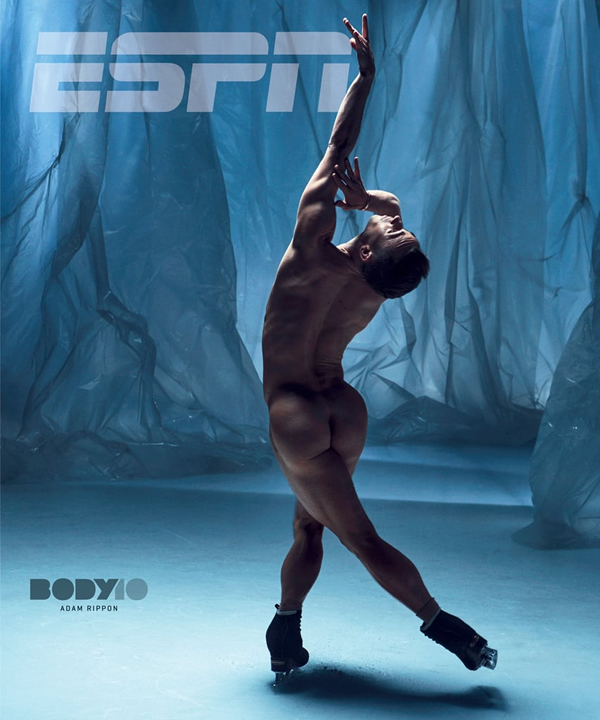
BLADE: What did you think of Johnny Weir and Tara Lipinski’s commentary of your Olympic performances?
RIPPON: They bring such excitement to skating. People tune in to watch the skating, but also to hear their opinions. They’re like Dick Button and Peggy Fleming for this generation, where you wanted to hear if Dick Button thought you were a good skater or not. They aren’t mean, they’re honest and now, being able to be more subjective, I see that. I remember there was one performance where Johnny said he thought I wasn’t interpreting the music well and I was like, “What? He doesn’t know what he’s talking about.” But as I watch it back now, I’m like, “No, he’s totally right.” He was just giving an honest opinion and it’s his job do to that. … They add flair to the whole competition.
BLADE: Did you ever hear from Mike Pence after the Olympics or was that just a big dog-and-pony show?
RIPPON: Well I knew that I never would, so I haven’t.
BLADE: Do you keep the Mirror Ball Trophy (from “Dancing With the Stars”) with all your skating medals? Or they displayed?
RIPPON: All my skating medals are in a container from the Container Store. The Mirror Ball Trophy is in a guest bedroom on the night stand. I have it out if somebody wants to see it, but it’s not something I’m looking at all the time. I want to focus on getting more things and — I know this is just in my own head — but not feel complicit in what I’ve achieved so far.
BLADE: You don’t even keep your Olympic medal out?
RIPPON: They came in beautiful boxes so I have it in the box on a side table with the medal inside. So it’s there if somebody wants to see it but it’s not like, “Oh wow, it’s hanging on the wall.”
BLADE: Any hint of sexual tension between you and (out Olympic skier) Gus Kenworthy or is that just totally a gay bromance?
RIPPON: It’s very much a brotherly sort of relationship. I adore him. We don’t talk all the time, but he’s just somebody I think I’ll always be kind of close to.
BLADE: You say in the book you and (figure skater) Ashley Wagner were close friends. Do you have any comment on her decision in August to say she was sexually assaulted (11 years prior by pairs skater John Coughlin, who committed suicide in January under similar allegations)?
RIPPON: I think it was brave. I’m sure it was really hard for her to do it. I think it’s going to hopefully create some good conversations with people within the sport.
BLADE: You say in the book you two were super close. Did she tell you about this shortly after it happened? Did you know John Coughlin?
RIPPON: I did know John, I thought, pretty well. But I had no idea any of this was going on and it’s been pretty tough ‘cause I wish I could have said something to someone or said something to him, but I didn’t have that opportunity. It’s something I think a lot of skaters are struggling with because we don’t agree with it. It’s not good. So many athletes aren’t equipped to deal with the suicide of someone that they knew. So it was really something challenging for a lot of people to get through and it was just something that was still, you know, pretty raw I think for a lot of people.
BLADE: What did you think of Yuzuru Hanyu’s (gold-winning) performances in PyeongChang?
RIPPON: I thought he was amazing. He’s incredible. Such a legend.
BLADE: Is he approachable or kind of in his own world? What’s it like being around such a great skater?
RIPPON: There’s a level of respect for everybody like that that all the competitors have regardless of who they are or what they’ve achieved. He’s always been super nice and I would say that I enjoyed competing with him as both gold older. One thing that helped is since he moved to Canada, his English got better so we could actually chat. As an adult, I enjoyed seeing him and getting to cheer for him and watch him compete.
BLADE: How do you feel about turning 30 (in November)?
RIPPON: I can’t wait. I’m really excited.
BLADE: Why?
RIPPON: I just feel like it’s perfect timing. I’m retiring from skating and starting this new phase of my life and career so the time feels really good. And I don’t know, I felt like I was 30 for a few years already anyway, so it’s all good timing.
BLADE: Does (boyfriend) JP (Jussi-Pekka Kajaala) live with you now in L.A.? How are things there?
RIPPON: JP goes back and forth between L.A. and Finland. I’m actually going there Friday.
BLADE: How often do you get to see each other on average?
RIPPON: We probably spend about five months out of the year together.
BLADE: Are you and (“Dancing With the Stars” dancing partner) Jenna (Johnson) still BFFs?
RIPPON: Um, yeah. I love her. We talk, like, very often.
BLADE: Are you a morning person by nature or did you kind of just force yourself to be one all those years getting up to train?
RIPPON: I’m not, but if I don’t force myself to be a morning person, I could stay in bed for like years.
BLADE: What do you have coming up? What do the next six months look like for you?
RIPPON: I’m on the book tour for two weeks, then right after that I have a few stops and I’m working on a few other things that will be announced soon, which is cool. I also just filmed another series of Breaking the Ice, the little videos on YouTube. Yeah, just stuff like that. It’s all good, nothing super busy.
BLADE: What would you like to be doing in 10 years?
RIPPON: I would love to still be working in entertainment, in comedy, and be successful. Let’s see, I don’t know, I just would like to be really successful, have more awards, right? I’m an athlete, I love a good trophy. So I think I really enjoy the kind of stuff I’m doing now and just continue to be a performer but like in a different way. I’d love to still be doing all this in 10 years.
a&e features
Doug Spearman takes his chance
‘Noah’s Arc: The Movie’ debuted on Paramount+ last month

There’s no question that when Patrik-Ian Polk’s series “Noah’s Arc” premiered on Logo 20 years ago, it was a groundbreaking creation. The story of a group of Black gay men and their wonderful friendship. The titular arc was that of the cute main character, Noah (Darryl Stephens), and his close-knit circle of friends, including Chance played by gay actor Doug Spearman. This compelling and loving fraternity may, in fact, be what brought viewers back repeatedly, including a 2008 movie, “Noah’s Arc: Jumping the Broom,” as well as the 2020 “Noah’s Arc” short, and now, a new full-length feature “Noah’s Arc: The Movie,” debuting on Paramount+ on June 20. In the movie, filled with equal measures of laughs and tears, Chance, who has faced a devastating loss, finds his dependable friends there, ready to support and comfort him at a moment’s notice. I had the pleasure of speaking with Spearman the morning of the streaming premiere of “Noah’s Arc: The Movie.”
WASHINGTON BLADE: Doug, since the early 2000s, when the “Noah’s Arc” series premiered on Logo, you have been playing the character of Chance, including in the latest installment, “Noah’s Arc: The Movie.” What was it about Chance that appealed to you as an actor?
SPEARMAN: When Patrik (-Ian Polk) called me to ask me to play him (Chance), I was at JFK airport in the baggage claim, waiting for a suitcase. He explained what the part was. The thing that stuck out to me was the fact that Chance was in a long-term relationship with another Black man. And, they had a child; they had a 4-year-old daughter named Kenya. I had never seen two Black gay men raise a child on TV before. I thought it was the most revolutionary thing I’d ever seen. I immediately thought I’ve got to do this because that was something nobody had seen. I thought it was incredibly important to take the part.
BLADE: “Noah’s Arc: The Movie” was, once again, written and directed by Patrik-Ian Polk, who you just mentioned, is the creator of the entire franchise. What’s the secret to your long-standing working relationship?
SPEARMAN: [Laughs] the whole team, all of us, are like a band of brothers. We fight like brothers, we come together like brothers, we hash things out, we talk, because we’re all very different from our characters. I think the challenge of playing these guys and then uplifting these men, playing a part, especially something written by Patrik, is like solving a math equation. There’s always a challenge that’s enjoyable for me as an actor: to try to find out what it is that Patrik wants, and then how do I do it.
BLADE: I think you do a very good job of it.
SPEARMAN: Thank you very much
BLADE: In the years between “Jumping the Broom” and the new full-length movie, many changes have occurred, and the story addresses some of them, including gay widowhood, which is something that the aging community is now confronting, as well as mental health issues. Please say a few words about how you approached those subjects in the new movie.
SPEARMAN: I had a lot of loss in my life, right before we started shooting. Two months before we started shooting the first series, my mother died. I was going through the grief process through that whole first season. Since then, I’ve lost a lot of people in my life. In fact, when we started shooting the second season, the second week we were shooting, my ex died of a heart attack. I was having to fold that into what I was doing with my life on the set and off the set. You’ve got to show up and you’ve got to do your work. The first two seasons of “Noah’s Arc” are always tinged with the memory of grief. So, when I had to deal with the death that Chance faces (in the new movie), which is a significant death in his life, it wasn’t that hard to reach back, especially the scene in the graveyard. It was something that I unfortunately could pull from personal experience.
BLADE: Shifting gears, the movie features delightful cast surprises, including Jasmine Guy and TS Madison. Did you have a chance to interact with either or both when they were on set?
SPEARMAN: No, I didn’t have any scenes with Jasmine, and I missed her. I wish I had gotten to see her because I actually got to direct Jasmine for a CBS promo shoot for “Queen,” back in the early ‘90s. I had a huge crush on her when she was on “A Different World.” So, I really would have liked to reconnect. But TS and I got to see each other every day because I was in all her scenes. It was extraordinary being around somebody like that. That is one outspoken woman!
BLADE: Even though Beyoncé never makes an appearance in the movie, there’s a lot of talk about her. Would you say you are a Beyoncé fan?
SPEARMAN: Yes! I’m breathing! Yes, I’m a Beyoncé fan. I actually got the chance to meet her. I knew her mom. Her mom was extraordinary to me. She is in the second movie I directed. She also gave us a wedding gown to use in the very first scene of the movie. That family is extraordinarily important to me. Not only just to be a fan, but to be somebody who’s gotten to know them and work with them and see how hard they work. I don’t think anybody works as hard as Tina or Beyoncé.
BLADE: There was a recent news item about gay actor Benito Skinner of the Amazon Prime series “Overcompensating” being told not to bother auditioning for straight roles. As an out actor yourself, how important do you think it is for queer characters to be portrayed by queer actors, and vice versa?
SPEARMAN: Being queer is a multifaceted identity. There’s no one kind of queer person. I think finding the best actor that’s your first circle of casting. I think one of the joys about being an actor is that you get to play different parts. I play straight guys all the time. Dads and husbands and things like that. I think a lot of people are told not to do it. In fact, I wouldn’t be Chance if the actor who was originally cast as Chance hadn’t been pulled out of the series by his agents because they didn’t want him to play a gay character.
BLADE: That’s amazing! Thank you for sharing that. Without giving away too much, the ending of the movie is a little ambiguous, even ending with a question mark. If there was a “Noah’s Arc: The Movie” sequel, would you come back for that?
SPEARMAN: Yeah! A lot of it would depend on what Chance’s journey is going to be like. Patrik and I have conversations like that all the time. He’s very interested and supportive of input. I hope I would be, as we all would be, part of the creative growth with these characters. They live in Patrik’s head, and he writes them, but we’re the ones who have to flesh them out. It’s a conversation, it’s always a conversation.
BLADE: You are currently performing in Molière’s “The Imaginary Invalid” as part of the New Orleans Shakespeare Festival at Tulane. What has this experience been like for you?
SPEARMAN: It’s extraordinary! I started on stage when I was seven. There’s nothing like working with a live audience and having that immediacy. I’m working with an extraordinarily talented cast in a really great play, and I have some of the best scene partners I could ever want.
BLADE: Are there any upcoming film or TV projects you’d like to mention?
SPEARMAN: I’m still a writer, and I’m still a director, and I’ve still got scripts that I would like to make. I have a little something that’s a cross between “Treme” and “Bridgerton” that I want to do. I’m always trying to figure out what the next thing is.
a&e features
Visit Cambridge, a ‘beautiful secret’ on Maryland’s Eastern Shore
New organization promotes town’s welcoming vibe, LGBTQ inclusion

CAMBRIDGE, Md. — Driving through this scenic, historic town on Maryland’s Eastern Shore, you’ll be charmed by streets lined with unique shops, restaurants, and beautifully restored Victorian homes. You’ll also be struck by the number of LGBTQ Pride flags flying throughout the town.
The flags are a reassuring signal that everyone is welcome here, despite the town’s location in ruby red Dorchester County, which voted for Donald Trump over Kamala Harris by a lopsided margin. But don’t let that deter you from visiting. A new organization, Proudly Cambridge, is holding its debut Pride event this weekend, touting the town’s welcoming, inclusive culture.
“We stumbled on a beautiful secret and we wanted to help get the word out,” said James Lumalcuri of the effort to create Proudly Cambridge.
The organization celebrates diversity, enhances public spaces, and seeks to uplift all that Cambridge has to share, according to its mission statement, under the tagline “You Belong Here.”
The group has so far held informal movie nights and a picnic and garden party; the launch party is June 28 at the Cambridge Yacht Club, which will feature a Pride celebration and tea dance. The event’s 75 tickets sold out quickly and proceeds benefit DoCo Pride.
“Tickets went faster than we imagined and we’re bummed we can’t welcome everyone who wanted to come,” Lumalcuri said, adding that organizers plan to make “Cheers on the Choptank” an annual event with added capacity next year.
One of the group’s first projects was to distribute free Pride flags to anyone who requested one and the result is a visually striking display of a large number of flags flying all over town. Up next: Proudly Cambridge plans to roll out a program offering affirming businesses rainbow crab stickers to show their inclusiveness and LGBTQ support. The group also wants to engage with potential visitors and homebuyers.
“We want to spread the word outside of Cambridge — in D.C. and Baltimore — who don’t know about Cambridge,” Lumalcuri said. “We want them to come and know we are a safe haven. You can exist here and feel comfortable and supported by neighbors in a way that we didn’t anticipate when we moved here.”

Lumalcuri, 53, a federal government employee, and his husband, Lou Cardenas, 62, a Realtor, purchased a Victorian house in Cambridge in 2021 and embarked on an extensive renovation. The couple also owns a home in Adams Morgan in D.C.
“We saw the opportunity here and wanted to share it with others,” Cardenas said. “There’s lots of housing inventory in the $300-400,000 range … we’re not here to gentrify people out of town because a lot of these homes are just empty and need to be fixed up and we’re happy to be a part of that.”
Lumalcuri was talking with friends one Sunday last year at the gazebo (affectionately known as the “gayzebo” by locals) at the Yacht Club and the idea for Proudly Cambridge was born. The founding board members are Lumalcuri, Corey van Vlymen, Brian Orjuela, Lauren Mross, and Caleb Holland. The group is currently working toward forming a 501(c)3.
“We need visibility and support for those who need it,” Mross said. “We started making lists of what we wanted to do and the five of us ran with it. We started meeting weekly and solidified what we wanted to do.”
Mross, 50, a brand strategist and web designer, moved to Cambridge from Atlanta with her wife three years ago. They knew they wanted to be near the water and farther north and began researching their options when they discovered Cambridge.
“I had not heard of Cambridge but the location seemed perfect,” she said. “I pointed on a map and said this is where we’re going to move.”
The couple packed up, bought a camper trailer and parked it in different campsites but kept coming back to Cambridge.
“I didn’t know how right it was until we moved here,” she said. “It’s the most welcoming place … there’s an energy vortex here – how did so many cool, progressive people end up in one place?”
Corey van Vlymen and his husband live in D.C. and were looking for a second home. They considered Lost River, W.Va., but decided they preferred to be on the water.
“We looked at a map on both sides of the bay and came to Cambridge on a Saturday and bought a house that day,” said van Vlymen, 39, a senior scientist at Booz Allen Hamilton. They’ve owned in Cambridge for two years.
They were drawn to Cambridge due to its location on the water, the affordable housing inventory, and its proximity to D.C.; it’s about an hour and 20 minutes away.
Now, through the work of Proudly Cambridge, they hope to highlight the town’s many attributes to residents and visitors alike.
“Something we all agree on is there’s a perception problem for Cambridge and a lack of awareness,” van Vlymen said. “If you tell someone you’re going to Cambridge, chances are they think, ‘England or Massachusetts?’”
He cited the affordability and the opportunity to save older, historic homes as a big draw for buyers.
“It’s all about celebrating all the things that make Cambridge great,” Mross added. “Our monthly social events are joyful and celebratory.” A recent game night drew about 70 people.
She noted that the goal is not to gentrify the town and push longtime residents out, but to uplift all the people who are already there while welcoming new visitors and future residents.
They also noted that Proudly Cambridge does not seek to supplant existing Pride-focused organizations. Dorchester County Pride organizes countywide Pride events and Delmarva Pride was held in nearby Easton two weeks ago.
“We celebrate all diversity but are gay powered and gay led,” Mross noted.
To learn more about Proudly Cambridge, visit the group on Facebook and Instagram.
What to see and do
Cambridge, located 13 miles up the Choptank River from the Chesapeake Bay, has a population of roughly 15,000. It was settled in 1684 and named for the English university town in 1686. It is home to the Harriet Tubman Museum, mural, and monument. Its proximity to the Blackwater National Wildlife Refuge makes it a popular stop for birders, drawn to more than 27,000 acres of marshland dubbed “the Everglades of the north.”
The refuge is walkable, bikeable, and driveable, making it an accessible attraction for all. There are kayaking and biking tours through Blackwater Adventures (blackwateradventuresmd.com).
Back in town, take a stroll along the water and through historic downtown and admire the architecture. Take in the striking Harriet Tubman mural (424 Race St.). Shop in the many local boutiques, and don’t miss the gay-owned Shorelife Home and Gifts (421 Race St.), filled with stylish coastal décor items.
Stop for breakfast or lunch at Black Water Bakery (429 Race St.), which offers a full compliment of coffee drinks along with a build-your-own mimosa bar and a full menu of creative cocktails.
The Cambridge Yacht Club (1 Mill St.) is always bustling but you need to be a member to get in. Snapper’s on the water is temporarily closed for renovations. RaR Brewing (rarbrewing.com) is popular for craft beers served in an 80-year-old former pool hall and bowling alley. The menu offers burgers, wings, and other bar fare.
For dinner or wine, don’t miss the fantastic Vintage 414 (414 Race St.), which offers lunch, dinner, wine tasting events, specialty foods, and a large selection of wines. The homemade cheddar crackers, inventive flatbreads, and creative desserts (citrus olive oil cake, carrot cake trifle) were a hit on a recent visit.
Also nearby is Ava’s (305 High St.), a regional chain offering outstanding Italian dishes, pizzas, and more.
For something off the beaten path, visit Emily’s Produce (22143 Church Creek Rd.) for its nursery, produce, and prepared meals.
“Ten minutes into the sticks there’s a place called Emily’s Produce, where you can pay $5 and walk through a field and pick sunflowers, blueberries, you can feed the goats … and they have great food,” van Vlymen said.
As for accommodations, there’s the Hyatt Regency Chesapeake Bay (100 Heron Blvd. at Route 50), a resort complex with golf course, spa, and marina. Otherwise, check out Airbnb and VRBO for short-term rentals closer to downtown.
Its proximity to D.C. and Baltimore makes Cambridge an ideal weekend getaway. The large LGBTQ population is welcoming and they are happy to talk up their town and show you around.
“There’s a closeness among the neighbors that I wasn’t feeling in D.C.,” Lumalcuri said. “We look after each other.”
a&e features
James Baldwin bio shows how much of his life is revealed in his work
‘A Love Story’ is first major book on acclaimed author’s life in 30 years

‘Baldwin: A Love Story’
By Nicholas Boggs
c.2025, FSG
$35/704 pages
“Baldwin: A Love Story” is a sympathetic biography, the first major one in 30 years, of acclaimed Black gay writer James Baldwin. Drawing on Baldwin’s fiction, essays, and letters, Nicolas Boggs, a white writer who rediscovered and co-edited a new edition of a long-lost Baldwin book, explores Baldwin’s life and work through focusing on his lovers, mentors, and inspirations.
The book begins with a quick look at Baldwin’s childhood in Harlem, and his difficult relationship with his religious, angry stepfather. Baldwin’s experience with Orilla Miller, a white teacher who encouraged the boy’s writing and took him to plays and movies, even against his father’s wishes, helped shape his life and tempered his feelings toward white people. When Baldwin later joined a church and became a child preacher, though, he felt conflicted between academic success and religious demands, even denouncing Miller at one point. In a fascinating late essay, Baldwin also described his teenage sexual relationship with a mobster, who showed him off in public.
Baldwin’s romantic life was complicated, as he preferred men who were not outwardly gay. Indeed, many would marry women and have children while also involved with Baldwin. Still, they would often remain friends and enabled Baldwin’s work. Lucien Happersberger, who met Baldwin while both were living in Paris, sent him to a Swiss village, where he wrote his first novel, “Go Tell It on the Mountain,” as well as an essay, “Stranger in the Village,” about the oddness of being the first Black person many villagers had ever seen. Baldwin met Turkish actor Engin Cezzar in New York at the Actors’ Studio; Baldwin later spent time in Istanbul with Cezzar and his wife, finishing “Another Country” and directing a controversial play about Turkish prisoners that depicted sexuality and gender.
Baldwin collaborated with French artist Yoran Cazac on a children’s book, which later vanished. Boggs writes of his excitement about coming across this book while a student at Yale and how he later interviewed Cazac and his wife while also republishing the book. Baldwin also had many tumultuous sexual relationships with young men whom he tried to mentor and shape, most of which led to drama and despair.
The book carefully examines Baldwin’s development as a writer. “Go Tell It on the Mountain” draws heavily on his early life, giving subtle signs of the main character John’s sexuality, while “Giovanni’s Room” bravely and openly shows a homosexual relationship, highly controversial at the time. “If Beale Street Could Talk” features a woman as its main character and narrator, the first time Baldwin wrote fully through a woman’s perspective. His essays feel deeply personal, even if they do not reveal everything; Lucian is the unnamed visiting friend in one who the police briefly detained along with Baldwin. He found New York too distracting to write, spending his time there with friends and family or on business. He was close friends with modernist painter Beauford Delaney, also gay, who helped Baldwin see that a Black man could thrive as an artist. Delaney would later move to France, staying near Baldwin’s home.
An epilogue has Boggs writing about encountering Baldwin’s work as one of the few white students in a majority-Black school. It helpfully reminds us that Baldwin connects to all who feel different, no matter their race, sexuality, gender, or class. A well-written, easy-flowing biography, with many excerpts from Baldwin’s writing, it shows how much of his life is revealed in his work. Let’s hope it encourages reading the work, either again or for the first time.
-

 U.S. Supreme Court3 days ago
U.S. Supreme Court3 days agoSupreme Court to consider bans on trans athletes in school sports
-

 Out & About3 days ago
Out & About3 days agoCelebrate the Fourth of July the gay way!
-

 Virginia3 days ago
Virginia3 days agoVa. court allows conversion therapy despite law banning it
-

 Federal Government5 days ago
Federal Government5 days agoUPenn erases Lia Thomas’s records as part of settlement with White House



